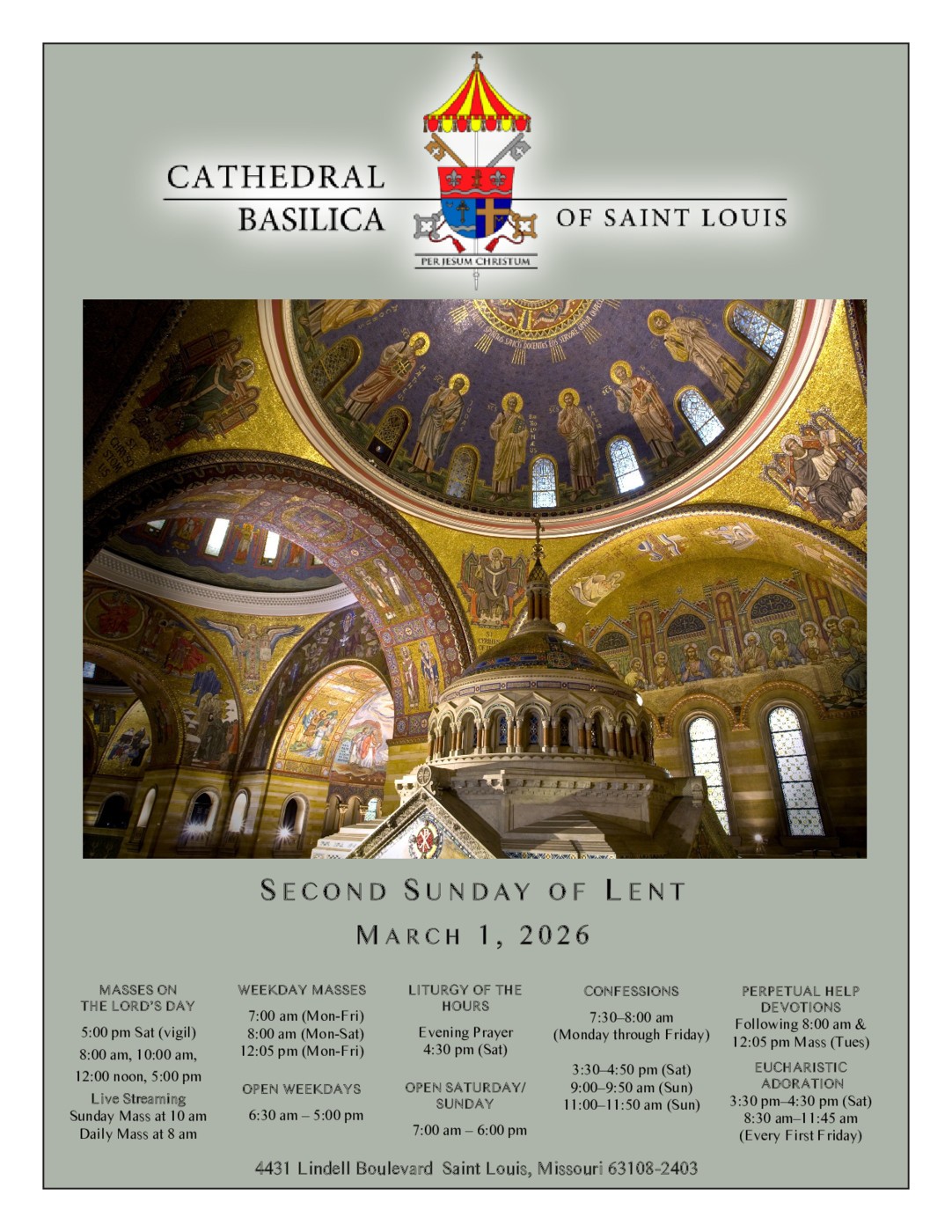Bulletins, Newsletters, and Flocknotes

We want to stay connected.
You need the most up-to-date information, and we want to give it to you.
If you attended Mass elsewhere and need a Bulletin, you can easily find it here organized by date. If you changed your email address and didn't get a Flocknote or a newsletter, you can find what you missed here.
Vatican News
Synod Office releases first two Final Reports of the Study Groups
March 3, 2026 - 5:08amThe General Secretariat of the Synod publishes the first two Final Reports of the Study Groups established by Pope Francis following the First Session of the XVI Ordinary General Assembly of the Synod of Bishops: that of Study Group No. 3 on 'The mission in the digital environment' and that of Study Group No. 4 on 'The revision of the Ratio Fundamentalis Institutionis Sacerdotalis in a missionary synodal perspective.'
Cardinal Radcliffe: In times of war, Christians are called to be people of hope
March 3, 2026 - 3:54amDominican Cardinal Timothy Radcliffe speaks to Vatican News about his ongoing visit to Ukraine, and the importance of prayer and Christian hope in times of conflict.
Vatican hosts seminar on AI and ethics
March 2, 2026 - 10:29amThe Secretariat for the Economy and the Holy See’s Labour Office organize an event on the potential and challenges of artificial intelligence, with the 'appreciation and encouragement' of the Pope.
Caritas Europa calls for local leadership at heart of humanitarian action
March 2, 2026 - 9:50amA new Caritas Europa report calls for a structural shift to place local actors at the heart of humanitarian action. At a time when humanitarian funding is shrinking, the report argues that locally-led action, which is rooted in social cohesion, must be protected and strengthened for the common good.
Bishop Martinelli: May Our Lady of Arabia watch over us and grant us peace
March 2, 2026 - 8:56amAfter US and Israeli attacks on Iran, Bishop Martinelli invites the faithful to pray for peace and the well-being of the people.
Parish Flocknote
Ash Wednesday - Schedule of Masses
February 15, 2026 - 2:00pmAsh Wednesday Schedule of Masses Wednesday, February 18, 2026 7:00 am Mass 8:00 am Mass 12:05 pm Mass 5:30 pm Mass Archbishop's Afternoon of Recollection Parishioners, their guests, and all throughout the Archdiocese are...Weekly Update
February 13, 2026 - 2:01pmSchedule for February 14-15 Saturday, February 14 7:00 am Cathedral Open for Private Prayer and Devotion 8:00 am Mass 11:00 am Wedding 3:30 - 4:30 pm Holy Hour - concluding with Evening Prayer and Benediction 3:30 pm – 5:00...Presentation of the Lord
February 1, 2026 - 2:01pmThis coming Monday, we celebrate the Feast of Jesus' Presentation at the temple 40 days after his birth. It places before our eyes a special moment in the life of the Holy Family: Mary and Joseph, in accordance with Mosaic...Weekly Update
January 30, 2026 - 4:28pmSchedule for January 31 - February 1 Saturday, January 31 7:00 am Cathedral Open for Private Prayer and Devotion 8:00 am Mass 3:30 - 4:30 pm Holy Hour - concluding with Evening Prayer and Benediction 3:30 pm – 5:00 pm...Closing Early - Monday
January 26, 2026 - 9:51amIn light of the cold temperatures and continued recovery from the recent snowstorm, the Cathedral Basilica will close early today, Monday, January 26, at 1:30 p.m . We appreciate your patience and understanding.
National Catholic Register
The Latest Iran War Is Going Well for the US, but How Will It End?
March 2, 2026 - 6:40pm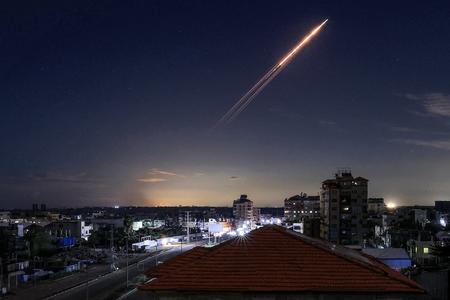 EYAD BABA
A missile launched from Iran is pictured in the sky from the Bureij camp for Palestinian refugees in the central Gaza Strip on March 1, 2026. The United States and Israel launched strikes against Iran on Feb. 28, killing Iran's supreme leader and top military leaders, prompting authorities to retaliate with strikes on Israel and U.S. bases across the Gulf.
EYAD BABA
A missile launched from Iran is pictured in the sky from the Bureij camp for Palestinian refugees in the central Gaza Strip on March 1, 2026. The United States and Israel launched strikes against Iran on Feb. 28, killing Iran's supreme leader and top military leaders, prompting authorities to retaliate with strikes on Israel and U.S. bases across the Gulf.
COMMENTARY: No matter what the U.S. does, the Iran that emerges from this war will be different.
An Extraordinary Lady Formed by Faith and Fire
March 2, 2026 - 5:23pm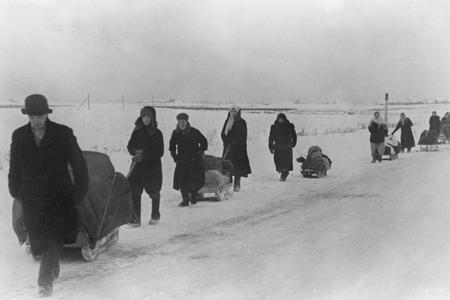 National Digital Archives, Poland
World War II refugees travel through snow-covered terrain in November 1941.
National Digital Archives, Poland
World War II refugees travel through snow-covered terrain in November 1941.
COMMENTARY: From war-torn Russia to the quiet strength of family life in America, Aunt Rose’s courage was forged in suffering and sustained by faith and humility.
St. Katharine Drexel Did What the Rich Young Man Couldn’t
March 2, 2026 - 4:43pm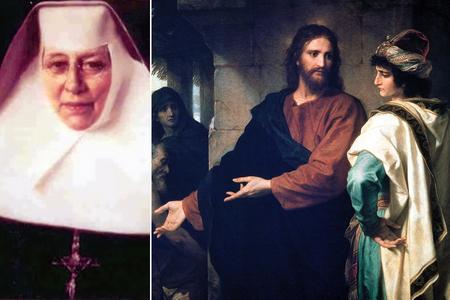 St. Katharine Drexel and Heinrich Hofmann’s 1889 painting, “Christ and the Rich Young Man”
St. Katharine Drexel and Heinrich Hofmann’s 1889 painting, “Christ and the Rich Young Man”
COMMENTARY: Mother Drexel was born into one of America’s wealthiest families — and spent her fortune and life as a missionary of the Blessed Sacrament.
Pope Leo XIV Promulgates New Statutes for Pontifical Academy for Life
March 2, 2026 - 4:08pm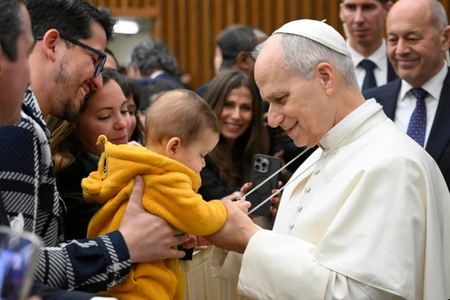 Vatican Media
Pope Leo XIV greets a baby during a general audience at the Vatican.
Vatican Media
Pope Leo XIV greets a baby during a general audience at the Vatican.
The new statues introduce the new role of 'supporters' who, while not academics, identify with the academy’s mission and 'contribute to the advancement of its academic activities.'
Putting in a Word for Purgatory
March 2, 2026 - 4:05pm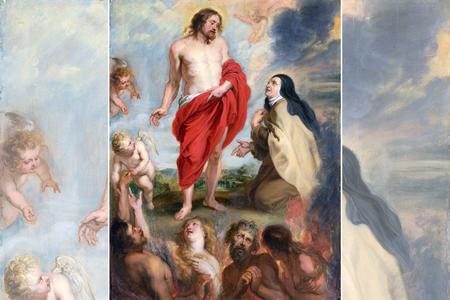 Rawpixel.com
Workshop of Peter Paul Rubens, “St. Teresa of Avila Interceding for Souls in Purgatory”
Rawpixel.com
Workshop of Peter Paul Rubens, “St. Teresa of Avila Interceding for Souls in Purgatory”
Few of us are ready for heaven at once. Yet in the purifying gaze of Christ, God’s justice is revealed as divine mercy, and hope is not extinguished but fulfilled.
First Things
Ralph Lauren, American Patriot
January 21, 2025 - 5:00amOn January 4 , President Joe Biden honored nineteen individuals with the Medal of Freedom, the highest civilian honor. While one could argue that some were less deserving of the award than others, I believe that one honoree deserved it without question: Ralph Lauren, a living embodiment of the American dream who in turn made America his muse. His designs pay homage to the cowboy, the soldier, the Ivy Leaguer. For Lauren, no aspect of the American character isn’t worth celebrating—a welcome contrast to the self-loathing that usually pervades the upper echelons of society.
Begging Your Pardon
January 20, 2025 - 5:00amWho attempts to overthrow a government without weapons? Why would the alleged leader of an insurrection authorize military force to protect the government, and why would the alleged insurrection victims countermand that authorization? How do people who listen to speeches about democratic procedures and election integrity in one location transform into enemies of the Constitution after walking a mile and a half to the east? Who believes that interrupting a vote would overturn a government? If there was an attempted insurrection, why would a notoriously creative and aggressive prosecutor fail to find any basis for filing insurrection charges?
To Hell With Notre Dame?
January 20, 2025 - 5:00amI first visited the University of Notre Dame du Lac (to use its proper inflated style) in 2017 as a guest of some friends in the law school. By then I had already hated the place for more or less my entire life. For me, Notre Dame was synonymous with the Roman Catholic Church as I had known her in childhood: dated folk art aesthetics (has anyone ever written about how ugly the buildings are?), the Breaking Bread missalette, the so-called “Celtic” Alleluia, the thought (though not the actual writings) of Fr. Richard McBrien, jolly fat Knights of Columbus in their blue satin jackets, avuncular permanent deacons named Tom, Pat, or, occasionally, Dave. At the age of twenty-seven, I expected to find preserved something of the religious atmosphere of the middle years of John Paul II’s papacy: the quiet half-acknowledged sense of desperation, the all-pervading horror of unbelief that could never be allowed formally to take shape among the grandchildren of European immigrants who had done well for themselves in the professions—perhaps too well.
The Mercurial Bob Dylan
January 17, 2025 - 5:00amThere’s a version of Bob Dylan for everyone: small-town boy from Duluth, Minnesota; scrappy folk troubadour of Greenwich Village; electric rock poet who defied expectations at Newport; introspective born-again Christian; Nobel Laureate. As any journalist who has interviewed him will attest, Dylan is an enigma. Capturing the whole man is harder than making a bead of mercury sit still in one’s palm.
The Theology of Music
January 17, 2025 - 5:00amÉ lisabeth-Paule Labat (1897–1975) was an accomplished pianist and composer when she entered the abbey of Saint-Michel de Kergonan in her early twenties. She devoted her later years to writing theology and an “Essay on the Mystery of Music,” published a decade ago as The Song That I Am , translated by Erik Varden . It’s a brilliant and beautiful essay, but what sets it apart from most explorations of music is its deeply theological character.






